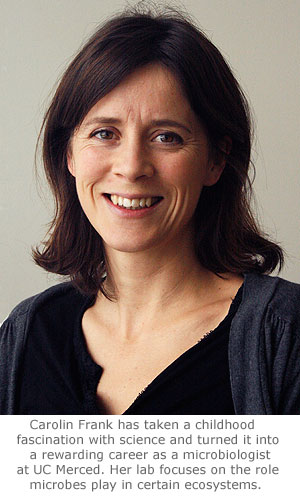

Carolin Frankrecalled one of her earliest exposures to the world of science.
She was about 10 years old and lived in a rural area of Sweden. While she enjoyed reading comics and Pippi Longstocking books, there were other topics she found just as interesting, namely genetics and DNA.
“My dad is a doctor and my mom is a teacher,” said Frank. “My dad had these high school text books on genetics that I would read. I remember being interested in DNA and genes early on.”
Now, as an assistant professor in the
School of Natural Sciencesat UC Merced, she’s turned a childhood fascination into career and calling. Frank, along with husband
David Ardell, joined the faculty a year ago. The main research focus of her
laboratoryinvolves studying ecology and plant-associated microbiology. She and her fellow researchers are using gene and genome sequencing to test ecological hypotheses. The goal? To examine the role microbes - microscopic organisms such as bacteria and fungi that are invisible to the human eye - play in certain ecosystems.
“Microbes are important organisms,” said Frank, who earned her doctorate from Uppsala University in Sweden. “They represent a big part of life but are understudied. Microbes are everywhere, and they have significant roles that we don’t even know about.”
Frank is working with fellow UC Merced professor
Lara Kuepperson a proposal to study microbes that live inside plants. She explained that people tend to think of microbes as pathogens, agents that cause disease. But most microbes are good for ecosystems. For example, bacteria and fungi that live inside healthy plant tissues can have beneficial relationship with their host and can help protect the plant against stress.
Kueppers plans to mimic climate changes to see how a species of conifer tree reacts to those changes. Frank will examine the role microbes play in the process. The research has the potential to change how forest ecosystems adapt to climate change.
Frank said she is excited to be a part of this campus’ academic and
researchcommunity. She is a member of the
Quantitative and Systems Biologyprogram’s
graduateadmittance committee and is a co-advisor for the
Computational Biology Journal Club. The group meets every other week to read and discuss science-related literature. And this spring, Frank looks forward to teaching her first class at UC Merced, a genetics course.
“Helping people understand and learn science is such a rewarding activity,” she said, while adding that UC Merced is an ideal location to teach and conduct ground-breaking research.
“I’m excited to work on a campus that has such as diverse student body,” said the trilingual Frank, who speaks English, Swedish and French. “It’s really a good time to be here.”






